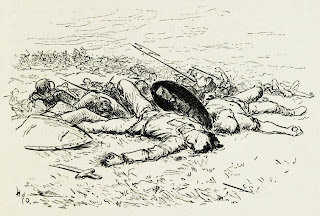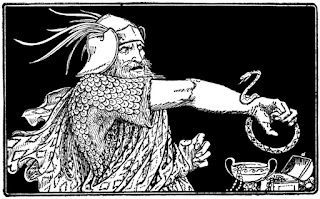The other day I talked about the advice that 'the extremely unlikely success or failure of an action means something about the world must be different'. I gave some reasons why this can make things harder for the GM and less satisfying for the players. I emphasized how important it is for the GM to be careful with the 'world-state' (the body of information about the fictional environment).
Van Winkle's article which prompted my writing also touched on a related issue with either the GM or a player establishing new facts about the world-state:
What if a player says, after landing a blow, "My character slashes the orc's forehead, causing blood to pour down his face"? Sounds cool, right? So you, the GM, nod your head and continue the excitement. But then the next round the player says, "Hey, shouldn't the orc attack me with some penalty because there's blood in his eyes?"
Van Winkle endorses a solution to this from ktrey: The GM should say "Let's see what happens when the orc attacks you. If he misses, we can say that the blood in his eyes played a part in his failure".
But this advice boils down to: ignore what has actually been established to be true in the game world. We could rephrase it as "the GM/player can establish something that definitely changed in the world but treat it as not actually having changed unless future dice rolls support it having changed". There's a strange implication that the GM can and ought to say "actually, this fact about the world can't have consequences", because the rules (mere tools the GM uses to interact with the world-state) are somehow more important than the underlying validity of the world-state!
I think it's fair to say this is contrary to the GM's fundamental role. Nothing that the GM (or player, in this case, where a player has been handed creative control) establishes about the world should be mere paper-thin "set dressing" which looks nice but which the characters can poke a finger through. Once something is established as true, it becomes usable by any PCs or NPCs or natural forces. Any knock-on effects must actually happen.
The combat example is a minor one, but even it has repercussions. What if the game has a spell that works on bleeding creatures? What penalties does the orc have? Can it benefit from attacks of opportunity / combat advantage / mechanic X? What about if it wasn't an orc, but a creature has corrosive blood, or a gaze attack? How long does it take to clean blood out of your eyes, for bleeding to stop, for the wound to heal?
Just take a more systematic approach
This pitfall isn't hard to avoid.
To begin with, the GM should keep careful track of their game's world-state. They should understand how the game's systems work and what the outcomes of those systems mean for the world-state.
They should only narrate beyond the extent of those outcomes with care, especially in situations like combat when PC life is on the line and players will feel cheated, not just disappointed, if a new piece of the world's reality gets established and then its consequences immediately ignored.
They should be extremely cautious in allowing player involvement in settling what's true in the world (beyond what the rules of the system allow).
For example, in a game that has hit points, the GM must understand what hit points are, what they represent in the world, and how systems interact with them. In some games, if a creature is knocked down to 5 hit points, you can narrate them being stabbed through the thigh. In some (most, frankly), you can only narrate the near-miss, the ensuing exhaustion, the draining of luck, etc. Being stabbed through the thigh, once established, is something that actually happened in the world. If the unfortunate victim is a baseline human and the world is anything like ours, then there are consequences: the victim almost certainly falls down, they may pass out from pain, they may bleed out slowly or in a matter of seconds, and their ability to attack, defend, climb a rope, and so on is drastically reduced. Is that a ton of extra GM work and possible interactions with parts of the rule set? Yes. Is it absolutely necessary? Yes. This is why games with hit points usually don't make them meat points.
But understanding the game's systems means it's easy to narrate. You know that a sword through the thigh is a grievous wound, so you know if the rules say a creature isn't mechanically penalised by injury, then you can't narrate any non-lethal attack as a stabbing. You know that kind of wound can't be slept off, so you know if the rules say a creature can get all their hit points back overnight, then when a creature is knocked to 0 hit points you can't say they were stabbed. In fact, in such a system, you can never narrate any wounds unless the creature also died – unless (a) you are just playing the game for laughs or (b) there's something in your world's metaphysics that makes wounds of all kinds short of death close overnight, with all the ensuing consequences to society.
All of this applies to the example with the orc getting blood in his eyes, of course. There the possible solutions are:
- Don't let players narrate their attacks and don't ever say anything about the world that isn't true and therefore supported by game mechanics, or
- Change to a system which actually mechanically supports whatever a player establishes as true about the world via the creative control they have been given, or
- Switch to free-form role-playing or storytelling.
If you study your game system and can't help but conclude that hit points are neither meat points nor luck points but also both those things, then it's only a matter of time until you have to contend with this issue. There is no solution other than fixing the game system or changing to one that's coherent. Even if you try to sidestep by deliberately narrating combat really vaguely, eventually a player will notice "I suffered wounds so terrible that I failed all but the final saving throw against instant death, and now it is ten hours later and those wounds have literally disappeared without any magic or miracle involved".
Finding a conclusion in all this
Ultimately this is part of a broader point: narrating an action's outcome isn't just a fun little bit of flavour, like it would be if you were telling a story. It's a major part of the role-playing game loop. If a player isn't treating the GM's description of the world as something their character can really interact with, then they might as well not be playing at all! The human interactivity, the "role-playing" part of a role-playing game, is the only advantage it has over other forms of media!
I think it's difficult to create a good role-playing game with collaborative story-telling elements because of issues like these. Role-playing is all about seeing what's in the game-world around your character and treating it as a real situation. When an RPG has story-telling elements, a player has to be both reactive/interactive (role-playing) and creative/declarative (story-telling): the same human brain making semi-godlike decisions about what is true in a world is also trying to make reasonable decisions on behalf of one person with certain goals and traits within that world. Disentangling those roles is difficult. It can cause unpleasant cognitive dissonance.
Think about the consequences before giving players additional creative control in a role-playing game.





No comments:
Post a Comment